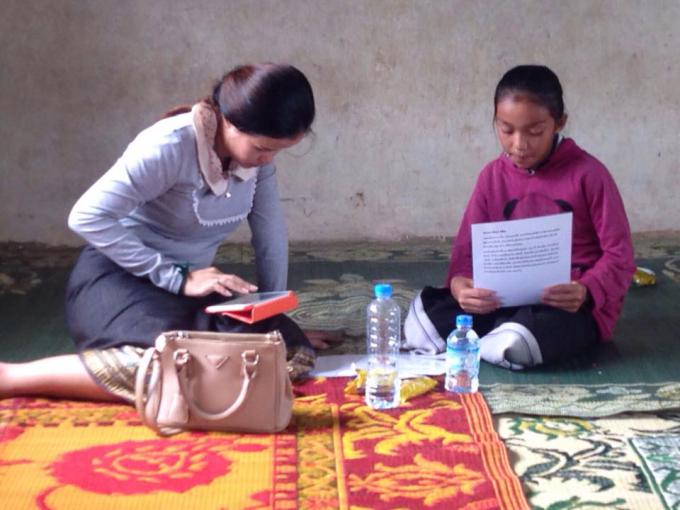Staff Spotlight: Overcoming Barriers to Quality Education for Children

Thipphaivone has been working as an Education Program officer of Save the Children in Laos for 7 months. Her primary responsibility involves managing budget and assisting the Program Director and Program Resources Manager.
Recently, Thipphaivone had a chance to support an assessment mission to collect baseline data for the new pilot project: Literacy Boost – aiming at improving reading skills of children. Because of the nature of her job which requires her to mostly be in the office, Thipphaivone really enjoyed this new experience of receiving assessor training together with programme colleagues, partners and university volunteers, collecting data, meeting with children and learning about their daily lives.
She added, “This reading assessment is an eye-opening experience for me. I have a chance to meet the children and experience their daily lives. Children need to help their family to do house work before and after going to school. During weekends, they would go to the field to help their family’s economy. So, parents do not have much time to teach their children because they must earn a living while many parents don’t have formal education. Only, a few children have textbooks at home while and many don’t even know what newspaper is.”
Such experience offered Thipphaivone an insightful view of the barriers to quality education for children. For example, to support the family, children have to join their parents working in the farms or doing household chores during their free time. Even though they may have free time, children still have minimal access to reading materials. Both of these make it difficult for children to go to school and to study or read during their free time.
Not only did Thipphaivone enjoy the field experience, she also found this assessment activity particularly intriguing because of the novelty in its mission. In fact, the team used computer tablets for data collection. Along with other enumerators, Thipphaivone was trained on using the device – primarily to store information in cost-effective, data-safe, and efficient fashion. With such a tool, Thipphaivone was able to collect much information on topics such as whether children have access to print materials, whether they can read or not – to name a few.
Despite the joy, excitement, and insight, Thipphaivone also experienced several challenges. For one, the use of tablets appeared to be difficult for some government pedagogical advisors. Another problem was the survey tool itself. Some translated texts were confusing, and a number of questions used in the survey seemed confusing for the children. And, the third challenge was communicating with children who do not speak Lao as their first language.
“Besides that, we found the problem with traveling as well. We had to separate into three groups. The road is very adventurous while some team members who had to travel by a small modest boat. Anyhow, we were really proud to help children.” she continued.
And, as target villages are in rural areas, it is inevitable to face a commuting challenge. Traveling to target villages was difficult both by road and water. The road was muddy and slippery, while the river was full of rapids, and it took a long time to reach some of the schools.
 Laos
Laos